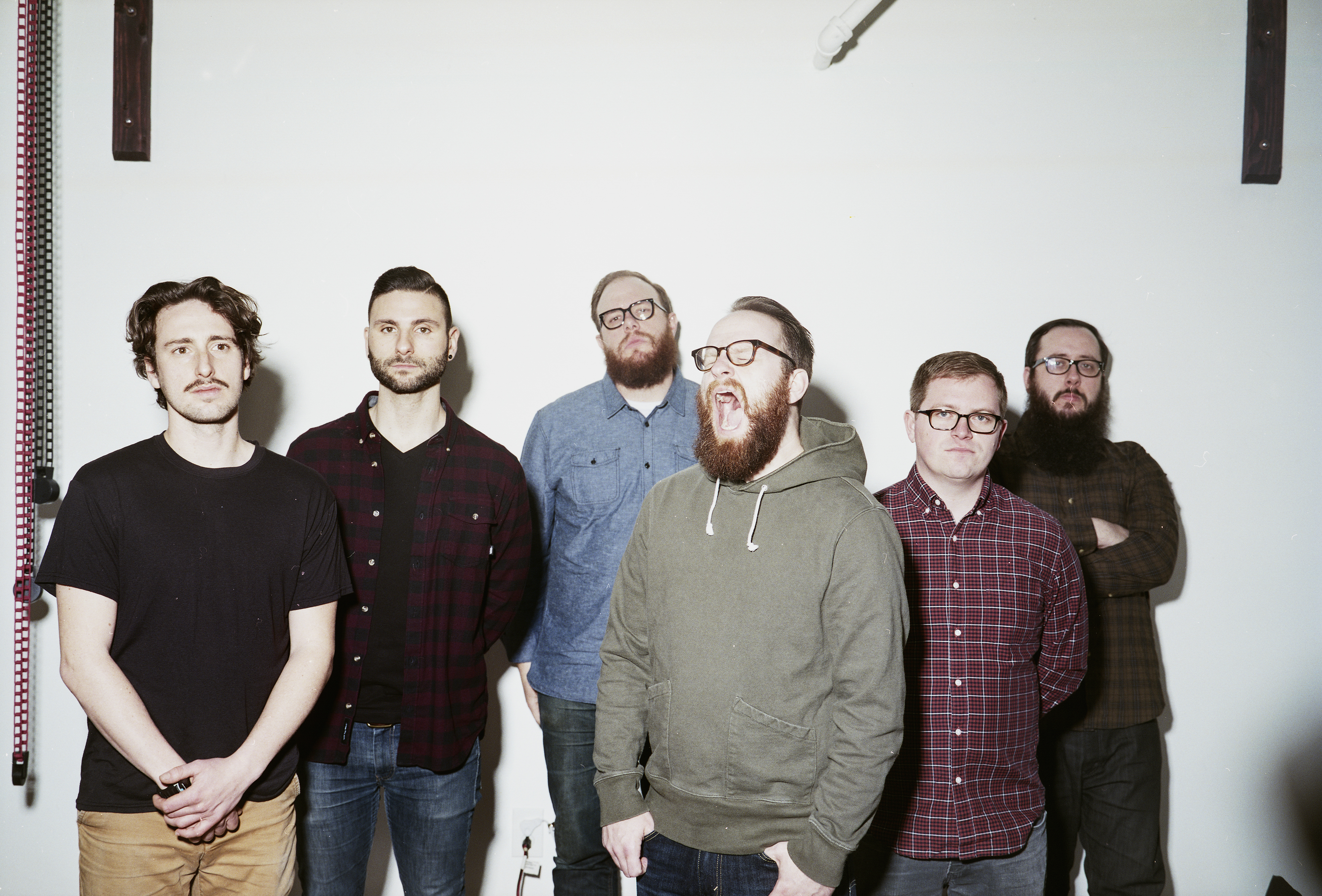Dan Campbell came out swinging from a south Philly basement seven years ago; now he’s trying to throw his arms around the world. The original plan to announce the Wonder Years’ new album Sister Cities was as wildly ambitious and globally minded as the record itself: a trailer would be unlocked with a password comprised of fifteen characters, each one printed on a poster hidden in fifteen international cities, and whoever found it would need to geotag and communicate with the others. Alas, someone hacked into the page source and leaked it before all that could unfurl.
The band’s desire to expand their reach was reflected in the recording of the album, too. They left their Philadelphia homebase, instead setting up in Los Angeles at the legendary Sunset Sound’s Studio 1 with a producer, Joe Chiccarelli, who’s worked on albums by Frank Zappa, White Stripes, the Strokes and Alanis Morissette. Once this decade’s preeminent bard of suburban intransigence, Campbell litters the songs on Sister Cities with heartening tales of human kindness in the Andes, Kyoto shrines, Costa Rican roadsides, and West Texas badlands, all in the hopes of counteracting the antagonism he sees in America with a message of community and human connectivity. As an artistic statement, Sister Cities succeeds on all fronts. But there’s a catch: the Wonder Years didn’t account for where a wildly ambitious and globally minded pop-punk band fit into all of this in 2018. As Campbell puts it: “We’re a band without a country.”
***
The Warped Tour will end after a final run this summer, and though the festival grew increasingly at odds with the Wonder Years’ progressive worldview, the band played it three times between 2011 and 2015. When I recall the last time Campbell and I crossed paths, it was during the 2014 Greatest Generation tour, the title referencing the Wonder Years’ triumphant third album and also the solidarity of the emo and pop-punk scenes that were starting to infiltrate the mainstream at the time. In retrospect, it’s a reminder of the fragility of both these scenes and the bands in it: Modern Baseball were emerging as generational talents before calling it quits to focus on their mental health. Real Friends had been primed from the beginning to inherit Taking Back Sunday’s role as pop-punk’s prime pinups, but singer Dan Lambton’s diagnosis of bipolar disorder has necessitated cancellation of several tours. Fireworks were one of most revered and underrated bands of their ilk, and that isn’t the sort of thing that’s sustainable for very long; much like the bands Campbell considers to be in the Wonder Years’ “pack,” like Polar Bear Club and Hostage Calm, Fireworks went on “indefinite hiatus.” The tour itself also feels like a relic of a time when five bands of all dudes could do a package tour without anyone raising an eyebrow.
On a surprisingly alt-country Sister Cities highlight, Campbell sings, “You’re a row home on an empty street / Where the others have been torn down and you’re the last one standing.” It’s ostensibly about a friend suffering through addiction, but it could just as easily describe the Wonder Years’ current status right as he croons the title: “It Must Get Lonely.” Then again, the Wonder Years are trying to transcend their old associations on Sister Cities. It’s a big boy album that you don’t come across a lot these days, everything that previous Wonder Years albums were (loud, hooky, lyrically detailed, centered around Campbell’s strident wail) and everything they weren’t (deliberately sequenced and paced, ballad-heavy, immaculately produced). But it’s also the sound of a band trying to level up to a scaffolding that might not be there anymore. Brand New had done more to foster mainstream acceptance of pop-punk and emo in the past fifteen years, but Jesse Lacey may have set it back even further when allegations of his sexual misconduct arose last November. The Wonder Years haven’t generated any radio hits, so they can’t pivot to pop like Paramore. Where does Sister Cities take them? KROQ rotation at a time when modern rock is created in the image of Imagine Dragons? Late night TV? Inclusion in non-punk festivals when nearly all of them book the previous year’s big indie winners, legacy acts or guitar bands that don’t rock?
It’s a hard truth for every band that tried to pivot out of Alt Press pop-punk, mid-2k emo or the Warped Tour—the fans can mature, embrace new interests, and evolve into new identities, but the bands cannot. “It gets a little frustrating when we get written about the same way [2011’s] Suburbia got written about,” Campbell grouses. “I want people to enjoy it in whichever way, but we wanna go on tour with certain kind of bands and play certain kind of festivals and it’s just like, ‘NO, because you are this thing and you don’t fit into this world with us.’”
This isn’t to say that Sister Cities is a make-or-break album for the Wonder Years. By every conceivable metric, they’re a band who has made it: their previous two albums debuted in the Billboard top 20 with almost no mainstream publicity or radio airplay. Suburbia I’ve Given You All and Now I’m Nothing and The Greatest Generation are thinking man’s pop-punk canon, invigorating and direct as the bands that dominated MTV in the early aughts, but with lyrics that astutely and empathetically surveyed post-grad socioeconomic anxiety like a public school Ezra Koenig. The former was commemorated by Hanif Abdurraqib in a thought-provoking essay included in his beloved collection They Can’t Kill Us Until They Kill Us, reflecting on its profound personal impact despite Abdurraqib being a black Muslim growing up in Columbus on the outside looking in on the white suburban upbringing Campbell experienced. “I had some concerns early in our career, would people be able to connect with something that was so specifically about me?,” Campbell asked. “One of the things that [Hanif] illuminated to me is that as long as the emotion is real and human, people are gonna be able to connect with it.” (Abdurraqib ended up writing the band’s bio for Sister Cities.)
But the Wonder Years are in a precarious position after 2015’s No Closer to Heaven. Yes, it peaked at No. 12 and was critically successful; Wonder Years albums achieve astronomical Metacritic scores because the only places that review them are feverishly enthusiastic punk sites. It’s also the first time they put out a record whose reputation has diminished since its release.
“I was just at this point where I wasn’t feeling very confident,” Campbell explains, echoing the sentiment of Wonder Years fans who felt that it was the first time the band left something to be desired. “I was constantly second-guessing myself: ‘Is this song good enough? This is what we’d normally do here and it’s good but…I dunno, maybe we should change it or maybe we shouldn’t?”
In the past, the band had always worked with a hard deadline, “because if it wasn’t done by then, we needed to get back on tour to pay our bills. Otherwise we’re gonna get evicted.” The urgency certainly helped when the Wonder Years were writing almost exclusively about getting the hell out of the suburbs, but No Closer to Heaven aspired towards something greater. “Cigarettes and Saints” was intended as a show-stopping ballad, but sounds flummoxed by the same trebly, hypercompressed production that the band used for their early, splenetic ragers. On “Stained Glass Ceilings,” Campbell wrestled with the falsities of racial and economic American privilege, trading lines with Letlive.’s Jason Butler, born to black and white parents in Inglewood. It was well-intentioned and way out of their depth, a step towards something different, in both composition and scope. But it was a tentative one.
“I was getting ready to get married, I had real rent to pay and I was thinking, ‘Man, I don’t want to fuck this up,’” Campbell says. “And you put so much pressure on yourself wondering, ‘What happens if I fail here,’ and then you end up with three fourths of a step rather than a full one.” But as for Sister Cities, “we took the full step and added that extra quarter that we owed you from last time.”
Campbell concedes it’s easy to be skeptical of that statement; he was fully confident No Closer to Heaven was the best Wonder Years album ever made at the time as well. But it’s clear that Sister Cities is the beneficiary of the Wonder Years recognizing where they had shortchanged themselves and having access to more of everything.
Without any sort of timetable, they had more leeway to fuss over the most granular details of songwriting. “Flowers Where Your Face Should Be” transformed from an Explosions in the Sky homage to a sweeping, tender ballad through a series of shifts as minor as playing with a lighter set of drumsticks. Campbell considers the opulent, orchestral closer “The Ocean Grew Arms to Hold Me” the best Wonder Years song ever written and it owes its existence to a stray comment about switching time signatures from 4/4 to 6/8. While he feels like the band has “plenty in the tank right now,” Campbell has entertained the possibility that the Sister Cities could be the last Wonder Years album, or at least the last before a “downshifting” in touring. “If that’s the last Wonder Years song that ever gets written,” he says, “I’ll feel really good about that.”
[featuredStoryParallax id=”285085″ thumb=”https://static.spin.com/files/2018/04/TWY_SPIN_3_FINAL-1523282224-300×205.jpg”]
More important than any of the above was having enough success from No Closer to Heaven to take time off the road. The prospect of extensive touring is an unworkable Catch-22 for most bands in the Wonder Years’ position; on the one hand, it’s about the only source of reliable income, but the band is in their thirties, several of them have gotten married in the past few years and are considering starting families. For months, Campbell has been pulling 15-18 hour days answering emails and plotting the Sister Cities album rollout. And that’s the easy part: in the next two months or so, between in-stores, pop-up shops, a UK tour followed a few week run in America, Campbell’s only day off will be spent at a wedding in Virginia. “That used to be exciting,” he says of tour life. “‘Yeah this is gonna be the most fun shit ever.’ And now, I’m trying not to tear up right now at the thought of leaving my wife for that long.”
If you’re wondering why most of pop-punk bands can’t transition into being lifers, here we are. “A lot of it is just reaching a point where you feel, ‘I need to get a real job,’” Campbell says. During the writing of Sister Cities, his thoughts often turned to Owen’s “One of These Days,” written when Mike Kinsella was still eight years away from playing festivals and 3,000-cap rooms when American Football reunited in 2014 as one of the most influential bands of its time. In it, Kinsella vows to maybe get one of those “real jobs” so he can afford the small signifiers of a DIY lifestyle, including acrylic paint, a new bike seat and guitar strings.
“It came out when I was living in one of these houses in South Philly that was $500 for the entire house, nothing in it worked and it was in a terrible neighborhood,” Campbell says. “And I was like, ‘Damn, this guy that I look up to, who I’ve gone and seen at the [Unitarian] Church like six times is still scraping together money to buy a bike seat. How the fuck am I ever gonna get out of this shitty South Philly neighborhood and get a house with working heat?'”
So for all of Campbell’s globetrotting, he’s never too far removed from where the Wonder Years started. The Greatest Generation’s “Teenage Parents” was a plainspoken, gutting account of Campbell’s upbringing in what he describes as “a not-huge town without any money. We were not destitute by any stretch of the imagination, but definitely low on the economic ladder.” Which is to say, he’s a product of the rural-suburban corridors that voted overwhelmingly for Trump and are the frequent targets of most pop culture’s political antagonism. These are also the places that pop-punk tends to quietly thrive.
Sister Cities’ penultimate rager “The Orange Grove” was inspired by a Wonder Years run through Odessa and Midland, Texas, “where the whole economy turns on the oil patch” and thus is more susceptible to any promises to restore the one way of life they know. “You’ll watch it decay / Lie through your teeth and say that you’ll resurrect a ghost,” Campbell screams on the hook. He appreciates the times when the Wonder Years can play these “ancillary” cities—what booking agents call “B-market” tours. “You go to West Virginia where you see people whose whole life is about coal, you see these economically depressed rural areas and it’s easy to understand maybe when someone gets on TV and builds them a series of paper tigers and says, ‘All the problems in your life are because of these people who are not like you,’ it can be easy to be convinced that you hate those people,” Campbell claims. “We’re trying to talk more about connectivity as a way to counter divisiveness.”
The belief in the inherent goodness of humanity is most evident in the Wonder Years’ music as well as their activist streak. They’ve certainly grappled with the best way for a band of six 30-something white men to participate in modern discourse: “The best thing we can do in any situation, whether it be about guns, race issues, gender issues, gender dysphoria issues, is to amplify the voices of the people who matter the most. We have a platform, but I don’t feel like our voice matters as much as the person living it.” In the meantime, the Wonder Years work to act on their principles outside of their lyrics; Campbell attended Temple University with the hopes of being a teacher and he volunteers between tours. Last year, the band livestreamed shows to raise money for Puerto Rico disaster relief, Casey Cavaliere teaches bass for the after-school program Rock for the Future and Campbell recently did a benefit show for Symphony for a Broken Orchestra, an organization that seeks repair kits for the thousands of unplayable instruments in the underfunded Philadelphia school district. “This goes back to No Closer to Heaven: even if we’re not gonna get to the place we want right away, we should still attempt to make progress on the way to that place.”
When I speak to Campbell, it’s the day after the international March For Our Lives protests; he’s been robbed at gunpoint and gun control is one of the topics upon which he will forever take a hardline stance (“I would love to run for Congress and have my slogan be, ‘I’m gonna take your guns! I’m gonna fucking take them”). However, because he’s susceptible to panic attacks in large crowds, he did not attend the march in Philadelphia. This is the same reason he did not attend the Philadelphia Eagles’ Super Bowl parade, despite them being one thing he might be more passionate about than the Wonder Years. “I have literally no shame in saying I fell to the floor and cried for four straight minutes of joy,” after New England Patriots quarterback Tom Brady’s failed Hail Mary finally hit the turf.
The heartening success of movements like March For Our Lives, Democratic Socialists of America and Antifa has been largely attributed to their abandonment of Obama-era liberal ideals of reaching across aisles to compromise, which lead me to feel a little bit skeptical about his hopes for Sister Cities.
“I don’t think our record runs counter intuitively to any progressive social movement but more as a complement to them,” Campbell says after mulling over the question. “We know that there there are always going to be people with whom compromise is not an option and frankly, we aren’t interested in compromise there.”
But he also doesn’t believe that human empathy is a limited resource, or American a zero-sum concept: “You trust me, you listen to my music, and thank you for that,” he says, envisioning the prospective listener, whether they’ve stuck around since “Keystone State Dude-Core” or are just tuning in because of recent press. “The big point for me on this record is to say, we went to all these places and we had all these life experiences with all these people who are very much the same as me. And I’m here to tell you that most people are pretty good.”





